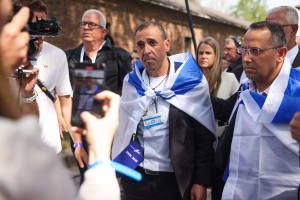Israel refuses to publish Iron Dome rate of successful interceptions so far
Interception success rate reached up to 97% in previous operations

Israeli officials have so far refused to discuss the success rate of the Iron Dome aerial defense system since the Israel-Hamas war began, unlike Israeli policy in previous wars.
The terror organization Hamas and its affiliated organizations in the Gaza Strip have so far fired at least 5,000 rockets toward Israel during the war that started with a surprise attack by Hamas on Oct. 7.
Although the number of Israeli victims due to rocket impacts has been relatively low, Israel Defense Forces officials have so far refused to give detailed statistics about how many rockets were intercepted by Iron Dome or about the rate of interceptions.
“I’m not going to tell the enemy the number of our intercepts,” IDF Foreign Media Spokesman Lt.-Col. Richard Hecht said in a press briefing on Oct. 12.
In the last conflict in Gaza, Operation Breaking Dawn in August 2022, during which the IDF targeted Palestinian Islamic Jihad terrorists, the Iron Dome had reportedly intercepted almost 97% of the rockets fired at Israel, according to the IDF,
The number of rockets fired during that short conflict was significantly lower than during the current war, however.
According to Mark Dubowitz, CEO of the think tank Foundation for the Defense of Democracies (FDD), there is no reason to think that Iron Dome is performing worse than in previous engagements.
Rather, he thinks that Israel’s refusal to go into detail has to do with managing public and international expectations, with an eye toward a possible entrance into the war by Hezbollah, Iran's terror-proxy in Lebanon.
“Full participation by Hezbollah would be a game-changer, as its rocket and missile arsenal dwarfs that of the Gaza factions and includes large numbers of precision-guided munitions that could potentially knock out key Israeli infrastructure," Dubowitz explained.
"In such an eventuality, the Israelis can be expected to dedicate the bulk of their Iron Dome and David’s Sling batteries to the defense of key military bases, power plants, airports, and seaports, which could leave other parts of the country exposed,” he continued.
“In that scenario, Israelis would be asked to act especially diligently about taking cover in bomb shelters when the sirens sound. So, it would be wise to disabuse Israeli civilians of the idea that they can rely indefinitely solely on active air defenses.”
IDF Spokesman Brig.-Gen. Daniel Hagari has been repeating that same sentiment during his daily briefings, stressing that the protection by Iron Dome wasn’t hermetic and pleading with the Israeli public to follow the military's instructions to take shelter for 10 minutes from the time a rocket alarm is activated.
Bradley Bowman, senior director of FDD’s Center on Military and Political Power, concurred and emphasized that a war with Hezbollah would likely involve tens of thousands of rockets fired at Israel.
“Supporters of Israel should know that too, so that we can move heaven and earth to do something about it. That should include urgent efforts to strengthen the Tamir interceptor supplier base in the United States and the creation of full Tamir production capacity here, too,” Bowman said.
Tamir is the Hebrew name for the missile used in the Iron Dome system.

The All Israel News Staff is a team of journalists in Israel.














